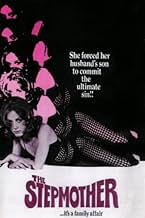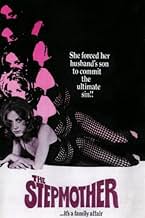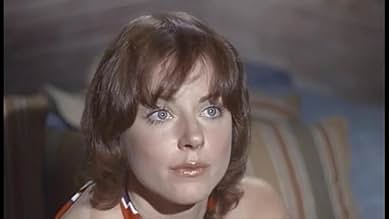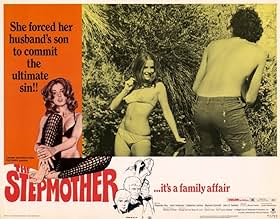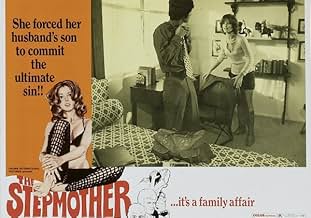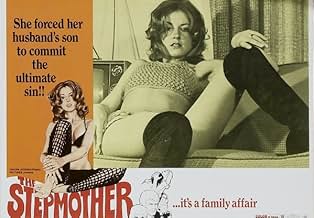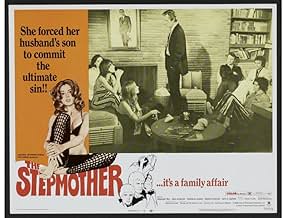As part of a blackmail plot, a woman is forced to seduce her new husband's son. Complications, including murder, ensue.As part of a blackmail plot, a woman is forced to seduce her new husband's son. Complications, including murder, ensue.As part of a blackmail plot, a woman is forced to seduce her new husband's son. Complications, including murder, ensue.
- Nominated for 1 Oscar
- 1 nomination total
Katherine Justice
- Margo Delgado
- (as Catherine Justice)
Margaret Garcia
- Lupé
- (as Margarite Garcia)
Gil Barreto
- José
- (as Gilberto Berreto)
Bert Madrid
- Mexican Businessman
- (as Burt Madrid)
David Garfield
- Goof
- (as John D. Garfield)
- Director
- Writer
- All cast & crew
- Production, box office & more at IMDbPro
4.1560
1
2
3
4
5
6
7
8
9
10
Featured reviews
More 70's drive-in fun from Crown International
A hot-headed architect thinks his wife is cheating on him, which leads him to murder. Another, even worse guy gets the blame but the police still have suspicions. Meanwhile, the stress of all this palaver drives his wife to seduce his son.
This drive-in flick was made by exploitation specialists Crown International in the period when they were producing their most consistently interesting work. While this isn't amongst their best as such, it's still effective enough and gets by quite a bit off the back of its early 70's charms. It has to be said that it indeed does take a long while before the title of the movie attains any relevance whatsoever but that's just one of the factors that gives this one its goofy appeal I reckon. So long as you don't go into this one with unrealistic expectations, then I think a pretty good time can be had. Its simple-minded melodrama kept me entertained in any case. On a final note, and what has to be the one thing that will always make this one at least a footnote in cinema history is the quite unbelievable fact that the crooning song with Latin beat that plays over the credits entitled 'Strange Are the Ways of Love' was actually nominated for an Academy Award! There is no way on Earth I ever expected anything from Crown International got anywhere near Oscar territory. The early 70's truly were strange days indeed
This drive-in flick was made by exploitation specialists Crown International in the period when they were producing their most consistently interesting work. While this isn't amongst their best as such, it's still effective enough and gets by quite a bit off the back of its early 70's charms. It has to be said that it indeed does take a long while before the title of the movie attains any relevance whatsoever but that's just one of the factors that gives this one its goofy appeal I reckon. So long as you don't go into this one with unrealistic expectations, then I think a pretty good time can be had. Its simple-minded melodrama kept me entertained in any case. On a final note, and what has to be the one thing that will always make this one at least a footnote in cinema history is the quite unbelievable fact that the crooning song with Latin beat that plays over the credits entitled 'Strange Are the Ways of Love' was actually nominated for an Academy Award! There is no way on Earth I ever expected anything from Crown International got anywhere near Oscar territory. The early 70's truly were strange days indeed
Not as good as The Stepfather.
Arriving home from a business trip, Frank Delgado (Alejandro Rey) finds that his wife Margo (Katherine Justice) has been entertaining his client Alan. In a jealous rage, Frank accosts Alan as he leaves his house, strangling him to death. After disposing of the body, Frank returns home, but the police are soon on his trail.
Believe it or not, drive-in flick The Stepmother was nominated for an Oscar in the best song category; it didn't win, but it's an interesting fact for avid fans of low budget '70s trash, the only people for whom this film will hold any kind of appeal.
A tawdry drama/thriller, The Stepmother is far from great cinema, suffering from a meandering storyline that takes an age to go anywhere, but it does deliver a few fun elements along the way, including those staples of the exploitation genre, violence and nudity (including the obligatory shower scene).
The film also features a spot of jazz flute (always a bonus in my book), bizarre use of random slo-mo and freeze frame, a crazy film director called Goof who uses beatnik speak (It's a gas! You dig?), a seduction scene between Margo and Frank's virginal son Steve (Rudy Herrera Jr.), and a couple of moments that I found unintentionally funny (the death of Frank's friend and the 'He's got a gun!' ending).
Worth seeing if only for the beautiful Ms. Justice. 4/10
Believe it or not, drive-in flick The Stepmother was nominated for an Oscar in the best song category; it didn't win, but it's an interesting fact for avid fans of low budget '70s trash, the only people for whom this film will hold any kind of appeal.
A tawdry drama/thriller, The Stepmother is far from great cinema, suffering from a meandering storyline that takes an age to go anywhere, but it does deliver a few fun elements along the way, including those staples of the exploitation genre, violence and nudity (including the obligatory shower scene).
The film also features a spot of jazz flute (always a bonus in my book), bizarre use of random slo-mo and freeze frame, a crazy film director called Goof who uses beatnik speak (It's a gas! You dig?), a seduction scene between Margo and Frank's virginal son Steve (Rudy Herrera Jr.), and a couple of moments that I found unintentionally funny (the death of Frank's friend and the 'He's got a gun!' ending).
Worth seeing if only for the beautiful Ms. Justice. 4/10
Weird even by weird 70's standards
I like weird 70's movies a lot, but this is weird even by weird 70's standards. It takes about half the movie, for instance, to even figure out why it's CALLED "The Stepmother"--it, at first, seems to be a movie about a jealous middle-aged, Mexican-American architect who murders a business associate after he finds him in bed with his younger gringa wife (and unbeknownst to the wife). By a weird coincidence another more lower-class Mexican also murders his wife in the same area and is framed for both murders. But the cops begins to suspect the architect, and his continuing jealously causes him to accidentally kill his partner and best friend (played by "MASH's" Larry Linville). He then has to fend off the amorous advances of the friend's widow before the cops grow even more suspicious. Got all that so far?
So why is it called "The Stepmother"? Well, about halfway through the man's son shows up from Mexico City, and he also starts messing around with the young wife (his stepmother)and the off-kilter plot REALLY goes into over-drive.
There are a few reasons to see this. First, if you're a weird 70's film completist. This film is kind similar to early 70's bizarro flick "Swinger's Massacre", which was equally ridiculous but had a less random plot. Second, if you're a fan of Larry Linville, he's actually pretty good here and acts circles around the rest of the unknown cast. The best reason perhaps though is this was the first appearance of cult drive-in queen Claudia Jennings. Jennings has a cameo role as a stoned-out hippie chick who has one hilarious line where she tell the cops she was "way too ripped" to remember what happened the night of the murder. (And if that isn't worth the price of admission, she also has her typically gratuitous full-frontal nude scene). Weird, weird movie, but if any of this sounds interesting to you, check it out.
So why is it called "The Stepmother"? Well, about halfway through the man's son shows up from Mexico City, and he also starts messing around with the young wife (his stepmother)and the off-kilter plot REALLY goes into over-drive.
There are a few reasons to see this. First, if you're a weird 70's film completist. This film is kind similar to early 70's bizarro flick "Swinger's Massacre", which was equally ridiculous but had a less random plot. Second, if you're a fan of Larry Linville, he's actually pretty good here and acts circles around the rest of the unknown cast. The best reason perhaps though is this was the first appearance of cult drive-in queen Claudia Jennings. Jennings has a cameo role as a stoned-out hippie chick who has one hilarious line where she tell the cops she was "way too ripped" to remember what happened the night of the murder. (And if that isn't worth the price of admission, she also has her typically gratuitous full-frontal nude scene). Weird, weird movie, but if any of this sounds interesting to you, check it out.
Family Crisis...
In THE STEPMOTHER, Frank (Alejandro Rey) catches his wife Margo (Katherine Justice) having sex with another man, leading to Frank's putting an end to loverboy. After disposing of the body, Frank scowls and frowns a lot while the police investigate.
Meanwhile, a carload of hipsters arrive, led by Dick (Larry Linville!). Frank continues his grimacing amidst the frolicking hepcats.
Uh oh!
Frank sees Margo and Dick together! Luckily, it's all just a misunderstanding. Unluckily, Frank is too jealous and enraged to care. Sorry, Dick! Hmmm, why is Frank taking you to the roof of a tall building?
Eeeeaagh!
THE STEPMOTHER is another drive-in ready movie from Crown International Pictures. It's perfect for its time, complete with senseless violence, ample female nudity, 1970's ambiance, and serious groov-i-tude. In addition, how could anyone not like a movie with a character called "The Goof" in it?
How, indeed...
Meanwhile, a carload of hipsters arrive, led by Dick (Larry Linville!). Frank continues his grimacing amidst the frolicking hepcats.
Uh oh!
Frank sees Margo and Dick together! Luckily, it's all just a misunderstanding. Unluckily, Frank is too jealous and enraged to care. Sorry, Dick! Hmmm, why is Frank taking you to the roof of a tall building?
Eeeeaagh!
THE STEPMOTHER is another drive-in ready movie from Crown International Pictures. It's perfect for its time, complete with senseless violence, ample female nudity, 1970's ambiance, and serious groov-i-tude. In addition, how could anyone not like a movie with a character called "The Goof" in it?
How, indeed...
Good cast, typical results
In the 70's, you would see a lot of skin in drama and thrillers. Then there's the sex factor that goes along with it. In "The Stepmother", there is plenty of that. Alejandro Rey("The Flying Nun") plays Frank, a successful building contractor who catches his client with his wife while he was on a business trip. He kills him, then buries his body at a beach. Unbeknownst to him, there's a fighting couple that comes up later. After getting rid of the evidence, the police comes up and tells that there are two bodies at the beach. Frank knows that he killed his client, but the other body is female. That makes him more uneasy. If that is bad, it gets worse when he accidentally kills his partner in the business. That makes him more unstable. For this one, business and pleasure, don't mix.
It has a great cast. But the ending was a letdown. It's worth the watch in certain ways. Only on a certain occasion.
2 out of 5 stars
Did you know
- TriviaThe Oscar nomination for "Strange Are The Ways Of Love" for Best Song marked the only time a Crown International Picture title got an Oscar nomination. It lost to "The Morning After" from The Poseidon Adventure (1972).
- Quotes
Sonya Hill: My life's empty without Dick.
- ConnectionsFeatured in Dusk to Dawn Drive-in Trash-o-Rama Show Vol. 8 (2002)
- SoundtracksStrange Are The Ways Of Love
(theme song)
Music by Sammy Fain
Lyrics by Paul Francis Webster
Arranged by Robert Matthews
Vocal by Manuel
- How long is The Stepmother?Powered by Alexa
Details
- Release date
- Country of origin
- Official site
- Language
- Also known as
- Impulsion
- Filming locations
- Los Angeles, California, USA(Filiming City)
- Production company
- See more company credits at IMDbPro
Contribute to this page
Suggest an edit or add missing content


